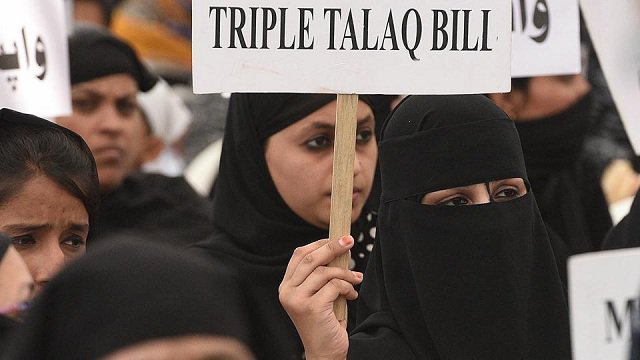Two years after triple talaq was declared unconstitutional by the Supreme Court, Indian Parliament passed the Muslim Women (Protection of Rights on Marriage) Bill, 2019, criminalising triple talaq.

The bill in its present form makes instant triple talaq a criminal offence and provides for a jail term of 3 years to a Muslim man pronouncing it.

To understand triple talaq better you need to know that there are three types of divorce in Islam – Ahsan, Hasan and Talaq-e-Biddat (triple or instant talaq). While Ahsan and Hasan are revocable, Talaq-e-Biddat is irrevocable.
Triple talaq refers to the pronouncement of talaq three times by a Muslim man in one sitting to his wife.

According to the All India Muslim Personal Law Board (AIMPLB), triple talaq is a matter of faith for the Hanafis, who make up more than 90% Sunnis in India and have been following it for 1,400 years now.
With the bill becoming a law, its declaration in spoken, written or through SMS or WhatsApp or any other electronic chat would be considered illegal and void.
Countries who ve banned instant Triple Talaq
— Anil patil (@beingani10) July 25, 2019
Pakistan Bangla Sri Lanka Turkey Cyprus Tunisia Algeria Malaysia Jordon Egypt Iran Iraq Brunei UAE Indonesia Libya Sudan Lebanon Saudi Arabia Morocco Kuwait
It’s needed for women Protection & Welfare#TripleTalaq #TripleTalaqBill pic.twitter.com/cRod8waV1g
Centuries of injustice faced by our Muslim women due to practice of #TripleTalaq has been finally abolished as the triple talaq bill today cleared Rajya Sabha hurdle. I congratulate Hon’ble PM @narendramodi Ji for this historic step to fight for the rights of our Muslim women.
— Pema Khandu (@PemaKhanduBJP) July 30, 2019
The new bill also makes triple talaq a cognisable offence and gives powers to the police to arrest the offender without requiring a warrant. But there is a condition that the complaint should be filed by the aggrieved woman or any of her relatives.
A welcome move in the bill is that it provides a scope for reconciliation without undergoing the process of nikah halala. This is possible only if the two sides agree to stop legal proceedings and settle the dispute.

The bill met with a strong opposition every time it was introduced in the Parliament. While some critics termed it redundant, others saw it as a means to harass Muslim men.
The fact that the bill has some flaws opens the possibility of its misuse against men.

As of now, the bill stands passed by both the houses of the Parliament and will become a law after it receives the President’s assent.

















